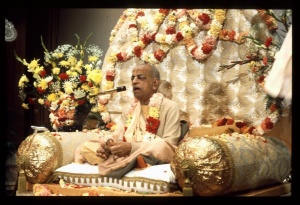SB 11.25.26: Difference between revisions
(Vanibot #0017 edit: indent verse and change id='' to class='' for SB) |
(Vanibot #0054 edit - transform synonyms into clickable links, which search similar occurrences) |
||
| Line 23: | Line 23: | ||
<div class="synonyms"> | <div class="synonyms"> | ||
''[//vanipedia.org/wiki/Special:VaniSearch?s=sāttvikaḥ&tab=syno_o&ds=1 sāttvikaḥ]'' — in the mode of goodness; ''[//vanipedia.org/wiki/Special:VaniSearch?s=kārakaḥ&tab=syno_o&ds=1 kārakaḥ]'' — the performer of activities; ''[//vanipedia.org/wiki/Special:VaniSearch?s=asaṅgī&tab=syno_o&ds=1 asaṅgī]'' — free from attachment; ''[//vanipedia.org/wiki/Special:VaniSearch?s=rāga&tab=syno_o&ds=1 rāga]-[//vanipedia.org/wiki/Special:VaniSearch?s=andhaḥ&tab=syno_o&ds=1 andhaḥ]'' — blinded by personal desire; ''[//vanipedia.org/wiki/Special:VaniSearch?s=rājasaḥ&tab=syno_o&ds=1 rājasaḥ]'' — the performer in the mode of passion; ''[//vanipedia.org/wiki/Special:VaniSearch?s=smṛtaḥ&tab=syno_o&ds=1 smṛtaḥ]'' — is considered; ''[//vanipedia.org/wiki/Special:VaniSearch?s=tāmasaḥ&tab=syno_o&ds=1 tāmasaḥ]'' — the performer in the mode of ignorance; ''[//vanipedia.org/wiki/Special:VaniSearch?s=smṛti&tab=syno_o&ds=1 smṛti]'' — from remembrance of what is what; ''[//vanipedia.org/wiki/Special:VaniSearch?s=vibhraṣṭaḥ&tab=syno_o&ds=1 vibhraṣṭaḥ]'' — fallen; ''[//vanipedia.org/wiki/Special:VaniSearch?s=nirguṇaḥ&tab=syno_o&ds=1 nirguṇaḥ]'' — transcendental; ''[//vanipedia.org/wiki/Special:VaniSearch?s=mat&tab=syno_o&ds=1 mat]-[//vanipedia.org/wiki/Special:VaniSearch?s=apāśrayaḥ&tab=syno_o&ds=1 apāśrayaḥ]'' — he who has taken shelter of Me. | |||
</div> | </div> | ||
Latest revision as of 20:37, 17 February 2024

A.C. Bhaktivedanta Swami Prabhupada
Please note: The synonyms, translation and purport of this verse were composed by disciples of Śrīla Prabhupāda
TEXT 26
- sāttvikaḥ kārako 'saṅgī
- rāgāndho rājasaḥ smṛtaḥ
- tāmasaḥ smṛti-vibhraṣṭo
- nirguṇo mad-apāśrayaḥ
SYNONYMS
sāttvikaḥ — in the mode of goodness; kārakaḥ — the performer of activities; asaṅgī — free from attachment; rāga-andhaḥ — blinded by personal desire; rājasaḥ — the performer in the mode of passion; smṛtaḥ — is considered; tāmasaḥ — the performer in the mode of ignorance; smṛti — from remembrance of what is what; vibhraṣṭaḥ — fallen; nirguṇaḥ — transcendental; mat-apāśrayaḥ — he who has taken shelter of Me.
Translation and purport composed by disciples of Śrīla Prabhupāda
TRANSLATION
A worker free of attachment is in the mode of goodness, a worker blinded by personal desire is in the mode of passion, and a worker who has completely forgotten how to tell right from wrong is in the mode of ignorance. But a worker who has taken shelter of Me is understood to be transcendental to the modes of nature.
PURPORT
A transcendental worker performs his activities in strict accordance with the directions of Lord Kṛṣṇa and the Lord's bona fide representatives. Taking shelter of the Lord's guidance, such a worker remains transcendental to the material modes of nature.